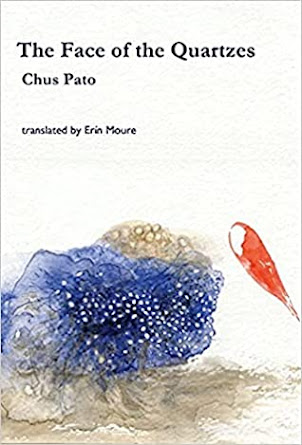Galicia is a promontory
of stone sitting on the Iberian peninsula above Portugal. Its language,
Galician, derived from Latin, is the root language of modern Portuguese and stubbornly
survives to the north of Portugal. Through long parts of Spain, Galicia, with
its Celtic substrate and different history and language, has never become
simply Spanish. The Face of the Quartzes is rooted in Ourense, the
Galician interior city bisected by the Miño River, where the poet was born and
raised during the long 20th-century Spanish dictatorship of
Francisco Franco. Ourense was long ago the Roman city of gold (ouro) and
of dawn’s golden light (aurora); Galicia may have been at the fringe of
the Roman Empire but it was a country of philosophy, and of international
travel and influence. Its mountainous rocky interior was mined for gold and
iron, metals key to ornament and armament. Its ports were cosmopolitan. Its fishermen
were known from the Baltic to Africa to the shores of Newfoundland and Maine.
It was a place peripheral and central at the same time. Though today Galicia is
even more peripheral in world politics, Chus Pato’s poetry recenters it. (“Passages
and the Unrequitable Gift: The Face of the Quartzes by Chus Pato, A
translator’s introduction”)
Sorting books in a corner of my office, I realized I hadn’t yet gone through Galician poet Chus Pato’s latest work translated into English, The Face of the Quartzes, translated by Montreal poet, translator and critic Erín Moure (El Paso TX: Veliz Books, 2019). A prolific translator, above and beyond her own extensive catalogue of writing (working through French, English, Spanish and Galician), Moure has been translating the work of Chus Pato for a number of years now, through five prior collections in English translation produced through BuschekBooks, Shearsman Books and Book*hug. Set with the English translation on the right and original Galician on the left, Pato’s The Face of the Quartzes offers a lyric suite of observational thought that scrape against the boundaries of perception, offering a light touch across a sequence of gestures, deep and dark and considered. “We redden the rose / using blood,” they (I say such, given the collaborative nature of translation) write, to close one particular lyric. One could describe each poem as untitled, at least in the more traditional manner, with either the opening word or opening phrase set in bold type, offered as title directly incorporated into the body of the text; reminiscent, slightly, of the late Vancouver poet Gerry Gilbert, who would offer, most notably through his infamous Moby Jane (Toronto ON: Coach House Press, 1987; Toronto ON: Coach House Books, 2004) [see my note on the reissue here], the beginning of the book-length poem on the front cover, ending finally on the back. The body of the book was too big to contain him, after all; the titling and outside still existing within the body of the text. “Winter gave way to rain,” they write, mid-way through the collection, “and the rain gave in to itself / we await a truth of language / I was born to hear the bark of dogs [.]” There aren’t too many poets working their titling in such a manner, opening the poem immediately, and the structure is curious, offering more of an ongoingness and interconnectedness to the larger, book-length structure of this particular suite. In certain ways, one could see The Face of the Quartzes as a singular poem, simply portioned into a sequence of moments, one thought directly set against and furthering another; one that moves through concerns around language, culture, ecology, and how we both move through and interact with the world, both immediate and further beyond. There is something very large about the way Pato encompasses the minutae of her world, something captured, fortunately, for those of us who exist only in English.
The hand assembles
words
my hand
that misjudges the size
of the letters and width of the wall
Up above
a bullet cuts through the
cry
separates the letters
the syllables
bodies tumble from the
peak
The hand returns beside the
others
they’re archaic
red black ochre
they agitate
like a handkerchief waving
goodbye
They sleep underfoot
upside down
like bats



No comments:
Post a Comment